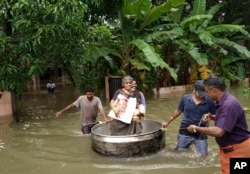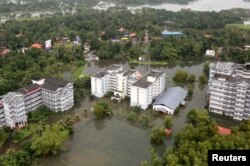From helicopters plucking families from rooftops to fishermen ferrying villagers to safety, India's response to deadly floods in Kerala has won praise, but experts say unchecked development contributed to the disaster.
Nearly 400 people have died since August 8 in the worst floods to hit the coastal state in a century, with dozens more missing and about a million forced into temporary camps after roads, bridges and homes were swept away.
As torrential rains began, the army, navy and national disaster response force teams swung into action, battling neck-high waters and mudslides to bring food and drinking water to tens of thousands of marooned people.
But it was the volunteer efforts that drew particular praise — from the fisherman who got on all fours and made a human step for women to clamber onto a boat, to prisoners preparing thousands of chapatis for homeless victims.
"The whole society came together, not only those in Kerala but from across the country," said Vikrant, head of Sphere India, a network of humanitarian agencies.
"Regular, common people — right from your fishermen to students to judges — came out to help, and that contributed in saving many people," Vikrant, who goes by one name, told the Thomson Reuters Foundation.
"We have not seen this in other states previously," he added, recalling floods in southern Tamil Nadu state in 2015 and in the northern mountainous state of Uttarakhand, where nearly 6,000 people were killed in 2013.
Flooding on the scale seen in Kerala could have killed 10 times more people a decade ago, but India's disaster management capacity has improved significantly in that time, said Chandra Bhushan of the Centre for Science and Environment think tank.
"The relief and rescue response in Kerala has been exemplary," he said.
"National government to state government to local authorities to NGOs to church, temple, fishermen, children — everyone participated and this must be recognized and lessons should be learned from this kind of response."
'Wake-up call'
Kerala received over 40 percent more rainfall than usual this monsoon, forcing authorities to release water from dozens of dams, which compounded the flooding.
But other man-made problems were also to blame.
Kerala is one of India's wealthiest states and has seen rapid unplanned development in recent years, with luxury resorts, residential complexes, power plants and mines built on floodplains, often in violation of the rules.
Critics say such unregulated construction on Kerala's river banks has caused deforestation and destruction of the mangroves that previously acted as shields against coastal erosion, increasing the risk of floods and landslides.
"The floods were inevitable, but the impact in Kerala was exacerbated by human influence: bad dam management, bad planning, deforestation and destruction of natural habitats," said Bhushan.
"We must start considering what is the ecological cost of development."
Chief Minister Pinarayi Vijayan has vowed to build "a new Kerala" instead of restoring old structures, with the help of experts on planning and management from across India.
"We have to be more cautious, we have to take steps to prevent such occurrences. Calamities would haunt us in future too," he told the Indian Express newspaper in an interview published Thursday.
Analysts, however, say Kerala ignored warnings of looming floods, including by ecologist Madhav Gadgil in a 2011 report that also set out ways the damage could be averted.
Kerala is estimated to have suffered damages of nearly $3 billion, which analysts say could rise 10-fold as waters recede and flood recovery begins — from clean-up and reconstruction to restoring livelihoods for farmers who lost land and crops.
Experts say authorities must install an early flood warning system, incentivize flood-control projects like stormwater management, plant more trees, and protect mangroves and wetlands to make communities more resilient to shocks.
"We must focus on how communities can thrive in the face of floods and increasing uncertainty around weather events," said Nathanial Matthews, a director at the Global Resilience Partnership.
"These kind of calamities need to act as a wake-up call to everyone."


